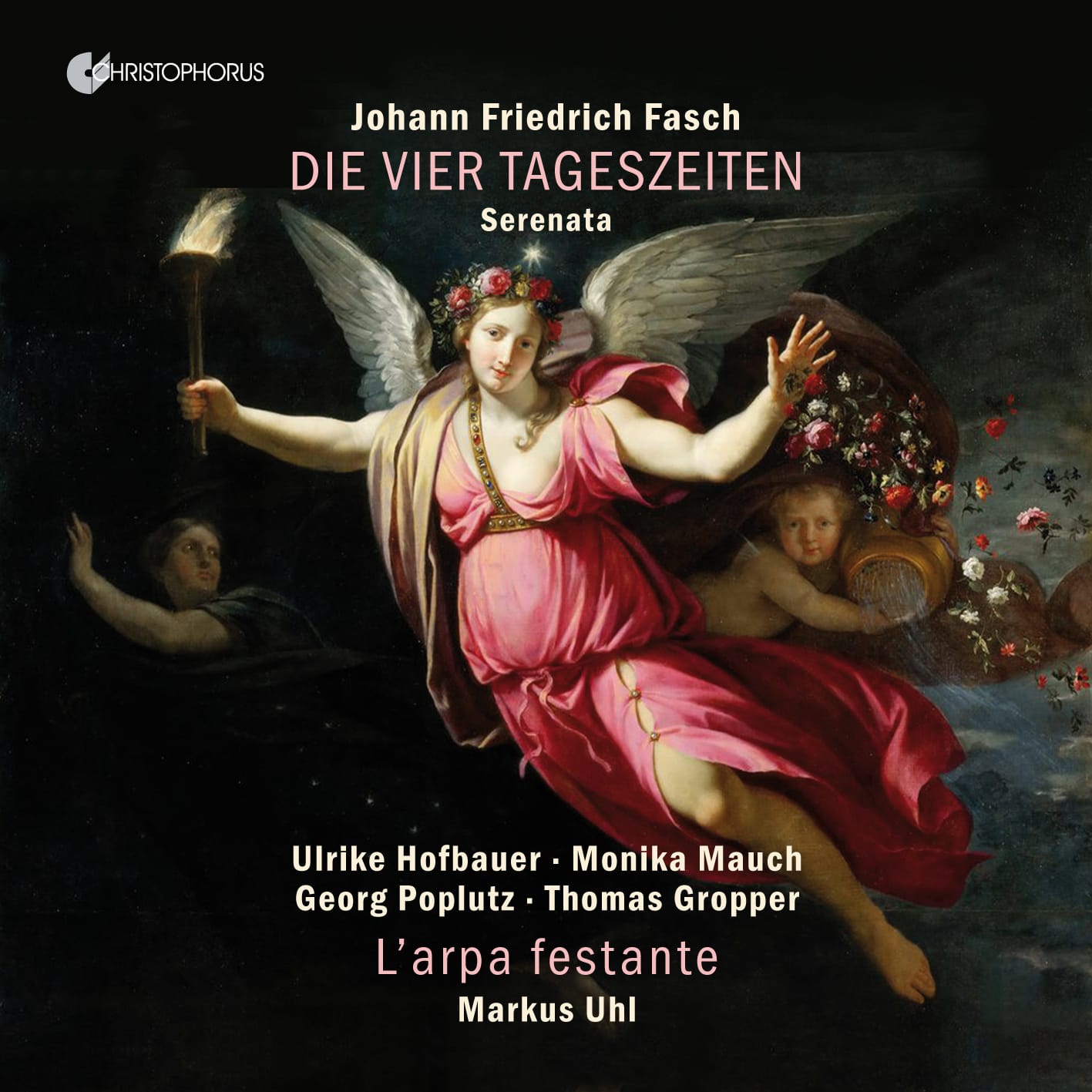
t is lovely to see some Johann Friedrich Fasch, his music is always colourful and imaginative. While in employment under Prince Johann August von Anhalt- Zerbst (1677-1742) as court Kapellmeister at the Anhaltinische Hof in Zerbst (Saxony-Anhalt), and for his birthday on June 9, 1723, Fasch composed The Four Day Times, a serenata for four soloists and a very colourful and lavish orchestra. With Aurora (the morning), Phoebus (the noon), Hesperus (the evening) and Cynthia (the night), the deities of the four times of day appear to pay homage to the ruler.
But the present disc begins with a Serenata, delightful and expert, heard in a reconstruction by Anthony Day. Fasch’s melodic and harmonic language is set out from the outset in these lovely opening “Lamento”. And, yes, that’s muted oboes:
Personally, I love the dark shadows of the Andante that follows. And here the noteworthy timbal effect is the use of a contrabassoon, which means when it is silent the pair of flutes seem to reach to the light:
Both third and fourth movement feature the chalumeau, a predecessor of the clarinet (you might have head some writers refer to the low, “chalumeau” register of the clarinet). its lyrical side is evident in the third movement, Largo ma non tanto:
The piece moves from to the beautifully bright and jaunty finale (“Un poco allegro”), full of soloist writing fo the chalumeau:
The completion is because there were some gaps in the original score due to the erosion of time. The performance by L’arpa festinate is superb, as is the recording.
The main offering is subtitled, “Freudenbezeugung der vier Tages zeiten – The Joyful Testimony of the Four Times of Day” . The inscription on the score is as follows:
Freuden-Bezeugung der Vier Tages-Zeiten/ welche/ An dem 9. August styl. Nov. 1723 einfallenden/ Hohen und Höchsterfreuli- chen/ Gebuths-Tage/ Des Durchlauchtigsten Fürsten und Herrn / HERRN / Joh. Augusts/ Fürstens zu Anhalt/ […] in einer / SERENATA/ Poetisch verfasset, auch musicalisch entworffen/ und auffgeführet worden/ von/ Johann Friedrich Faschen/ Hoch-Fürstl. Anhalt-Zerbst. Capell Meistern./ Zerbst./ gedruckt bey Samuel Tietzen, H. F. Hof- und Regierungs-Buchdrucker.
… which means “Joyful testimony of the four times of day/ which/ on the 9th August styl. Nov. 1723/ High and Most Joyful / Birthday/ of the Most Serene Prince and Lord/ Lord/ Joh. August/ Prince of Anhalt/ […] in a/ SERENATA/ Po- etically composed, also musically designed/ and performed/ by/ Johann Friedrich Faschen/ Noble Anhalt-Zerbst. Capell Master./ Zerbst/ printed by Samuel Tietzen, court and governmental printer”.
The characters in the serenata are Aurora (alto); Phoebus (tenor); Hesperus (bass) and Cynthia (soprano).
It begins with Phoebus, and a miracle of an aria performed by the simply amazing Georg Poplutz. This is some of the finest high tenor singing I have heard (and his agility in the late aria, “Mein Glanz bestrahlt zwar die Welt” ain’t bad either:
The “choruses” are sung by the soloists in this recording: given the lines are heard in dialogue as well as together, and the mode of that dialogue, one assumes this is intended more of an ensemble.
Monika Mauch is a fine alto, is not as individual as Poplutz. Here’s her “Mei erhöltes Rosenlicht”:
On of Fasch’s finest moments is the daily-shaded bass aria “Schlage ihr Stunden”; unfortunately, bass Thomas Gropper is the weakest soloist, his voice somewhat insubstantial. Better on a performative level is the lovely soprano aria, “Schlaf du Herrscher disses Landes”, with Ulrike Hofbauer’s beautifully clear soprano garlanded by woodwind:
It is Cynthia (Hofbauer) who has the last solo word, with the aria ”Der Himmel kana dich nicht Allen Lassen”.
Markus Uhl beings the whole thing together beautifully, with the perfect sense of style. The final chorus carries real gravitas and joy (“Es lebe Fürst Johann August”):
A stunning release. All lovers of the Baroque need to heal this.
All works are world premiere recordings. The Amazon link is here.









